Yuqi Zhu
OceanGym: A Benchmark Environment for Underwater Embodied Agents
Sep 30, 2025Abstract:We introduce OceanGym, the first comprehensive benchmark for ocean underwater embodied agents, designed to advance AI in one of the most demanding real-world environments. Unlike terrestrial or aerial domains, underwater settings present extreme perceptual and decision-making challenges, including low visibility, dynamic ocean currents, making effective agent deployment exceptionally difficult. OceanGym encompasses eight realistic task domains and a unified agent framework driven by Multi-modal Large Language Models (MLLMs), which integrates perception, memory, and sequential decision-making. Agents are required to comprehend optical and sonar data, autonomously explore complex environments, and accomplish long-horizon objectives under these harsh conditions. Extensive experiments reveal substantial gaps between state-of-the-art MLLM-driven agents and human experts, highlighting the persistent difficulty of perception, planning, and adaptability in ocean underwater environments. By providing a high-fidelity, rigorously designed platform, OceanGym establishes a testbed for developing robust embodied AI and transferring these capabilities to real-world autonomous ocean underwater vehicles, marking a decisive step toward intelligent agents capable of operating in one of Earth's last unexplored frontiers. The code and data are available at https://github.com/OceanGPT/OceanGym.
Why Do Open-Source LLMs Struggle with Data Analysis? A Systematic Empirical Study
Jun 24, 2025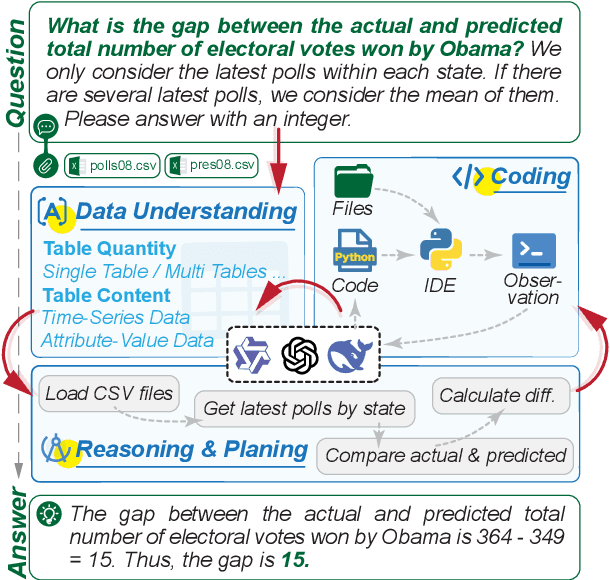
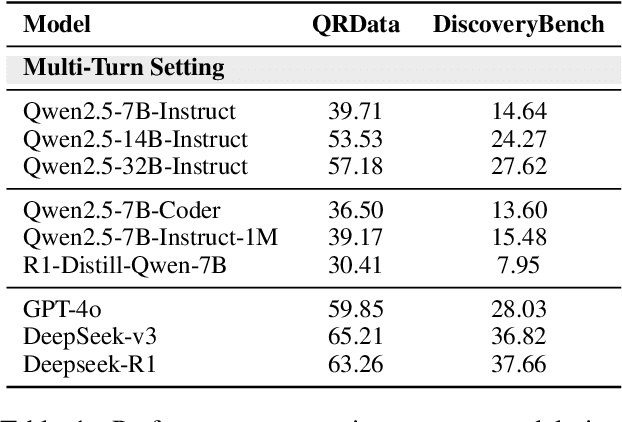

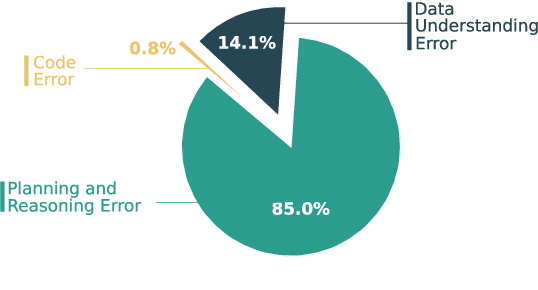
Abstract:Large Language Models (LLMs) hold promise in automating data analysis tasks, yet open-source models face significant limitations in these kinds of reasoning-intensive scenarios. In this work, we investigate strategies to enhance the data analysis capabilities of open-source LLMs. By curating a seed dataset of diverse, realistic scenarios, we evaluate models across three dimensions: data understanding, code generation, and strategic planning. Our analysis reveals three key findings: (1) Strategic planning quality serves as the primary determinant of model performance; (2) Interaction design and task complexity significantly influence reasoning capabilities; (3) Data quality demonstrates a greater impact than diversity in achieving optimal performance. We leverage these insights to develop a data synthesis methodology, demonstrating significant improvements in open-source LLMs' analytical reasoning capabilities.
Knowledge Augmented Complex Problem Solving with Large Language Models: A Survey
May 06, 2025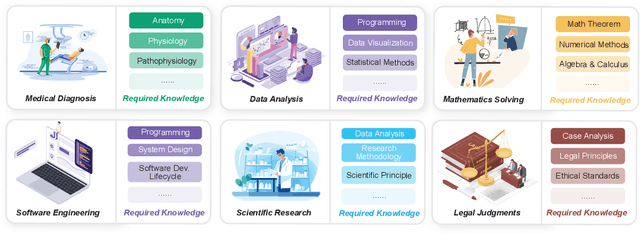
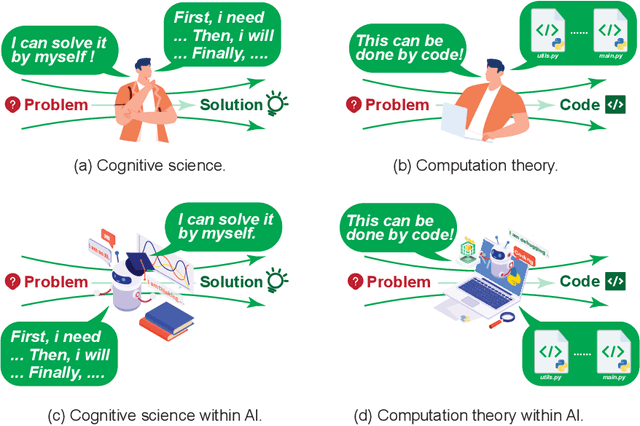
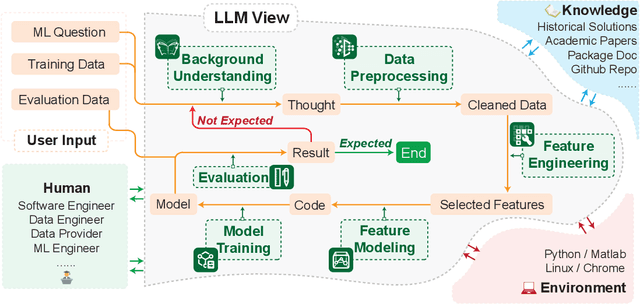

Abstract:Problem-solving has been a fundamental driver of human progress in numerous domains. With advancements in artificial intelligence, Large Language Models (LLMs) have emerged as powerful tools capable of tackling complex problems across diverse domains. Unlike traditional computational systems, LLMs combine raw computational power with an approximation of human reasoning, allowing them to generate solutions, make inferences, and even leverage external computational tools. However, applying LLMs to real-world problem-solving presents significant challenges, including multi-step reasoning, domain knowledge integration, and result verification. This survey explores the capabilities and limitations of LLMs in complex problem-solving, examining techniques including Chain-of-Thought (CoT) reasoning, knowledge augmentation, and various LLM-based and tool-based verification techniques. Additionally, we highlight domain-specific challenges in various domains, such as software engineering, mathematical reasoning and proving, data analysis and modeling, and scientific research. The paper further discusses the fundamental limitations of the current LLM solutions and the future directions of LLM-based complex problems solving from the perspective of multi-step reasoning, domain knowledge integration and result verification.
LightThinker: Thinking Step-by-Step Compression
Feb 21, 2025Abstract:Large language models (LLMs) have shown remarkable performance in complex reasoning tasks, but their efficiency is hindered by the substantial memory and computational costs associated with generating lengthy tokens. In this paper, we propose LightThinker, a novel method that enables LLMs to dynamically compress intermediate thoughts during reasoning. Inspired by human cognitive processes, LightThinker compresses verbose thought steps into compact representations and discards the original reasoning chains, thereby significantly reducing the number of tokens stored in the context window. This is achieved by training the model on when and how to perform compression through data construction, mapping hidden states to condensed gist tokens, and creating specialized attention masks. Additionally, we introduce the Dependency (Dep) metric to quantify the degree of compression by measuring the reliance on historical tokens during generation. Extensive experiments on four datasets and two models show that LightThinker reduces peak memory usage and inference time, while maintaining competitive accuracy. Our work provides a new direction for improving the efficiency of LLMs in complex reasoning tasks without sacrificing performance. Code will be released at https://github.com/zjunlp/LightThinker.
Bias in Decision-Making for AI's Ethical Dilemmas: A Comparative Study of ChatGPT and Claude
Jan 17, 2025



Abstract:Recent advances in Large Language Models (LLMs) have enabled human-like responses across various tasks, raising questions about their ethical decision-making capabilities and potential biases. This study investigates protected attributes in LLMs through systematic evaluation of their responses to ethical dilemmas. Using two prominent models - GPT-3.5 Turbo and Claude 3.5 Sonnet - we analyzed their decision-making patterns across multiple protected attributes including age, gender, race, appearance, and disability status. Through 11,200 experimental trials involving both single-factor and two-factor protected attribute combinations, we evaluated the models' ethical preferences, sensitivity, stability, and clustering of preferences. Our findings reveal significant protected attributeses in both models, with consistent preferences for certain features (e.g., "good-looking") and systematic neglect of others. Notably, while GPT-3.5 Turbo showed stronger preferences aligned with traditional power structures, Claude 3.5 Sonnet demonstrated more diverse protected attribute choices. We also found that ethical sensitivity significantly decreases in more complex scenarios involving multiple protected attributes. Additionally, linguistic referents heavily influence the models' ethical evaluations, as demonstrated by differing responses to racial descriptors (e.g., "Yellow" versus "Asian"). These findings highlight critical concerns about the potential impact of LLM biases in autonomous decision-making systems and emphasize the need for careful consideration of protected attributes in AI development. Our study contributes to the growing body of research on AI ethics by providing a systematic framework for evaluating protected attributes in LLMs' ethical decision-making capabilities.
Consistency of Responses and Continuations Generated by Large Language Models on Social Media
Jan 15, 2025



Abstract:Large Language Models (LLMs) demonstrate remarkable capabilities in text generation, yet their emotional consistency and semantic coherence in social media contexts remain insufficiently understood. This study investigates how LLMs handle emotional content and maintain semantic relationships through continuation and response tasks using two open-source models: Gemma and Llama. By analyzing climate change discussions from Twitter and Reddit, we examine emotional transitions, intensity patterns, and semantic similarity between human-authored and LLM-generated content. Our findings reveal that while both models maintain high semantic coherence, they exhibit distinct emotional patterns: Gemma shows a tendency toward negative emotion amplification, particularly anger, while maintaining certain positive emotions like optimism. Llama demonstrates superior emotional preservation across a broader spectrum of affects. Both models systematically generate responses with attenuated emotional intensity compared to human-authored content and show a bias toward positive emotions in response tasks. Additionally, both models maintain strong semantic similarity with original texts, though performance varies between continuation and response tasks. These findings provide insights into LLMs' emotional and semantic processing capabilities, with implications for their deployment in social media contexts and human-AI interaction design.
Showing LLM-Generated Code Selectively Based on Confidence of LLMs
Oct 04, 2024Abstract:Large Language Models (LLMs) have shown impressive abilities in code generation, but they may generate erroneous programs. Reading a program takes ten times longer than writing it. Showing these erroneous programs to developers will waste developers' energies and introduce security risks to software. To address the above limitations, we propose HonestCoder, a novel LLM-based code generation approach. HonestCoder selectively shows the generated programs to developers based on LLMs' confidence. The confidence provides valuable insights into the correctness of generated programs. To achieve this goal, we propose a novel approach to estimate LLMs' confidence in code generation. It estimates confidence by measuring the multi-modal similarity between LLMs-generated programs. We collect and release a multilingual benchmark named TruthCodeBench, which consists of 2,265 samples and covers two popular programming languages (i.e., Python and Java). We apply HonestCoder to four popular LLMs (e.g., DeepSeek-Coder and Code Llama) and evaluate it on TruthCodeBench. Based on the experiments, we obtain the following insights. (1) HonestCoder can effectively estimate LLMs' confidence and accurately determine the correctness of generated programs. For example, HonestCoder outperforms the state-of-the-art baseline by 27.79% in AUROC and 63.74% in AUCPR. (2) HonestCoder can decrease the number of erroneous programs shown to developers. Compared to eight baselines, it can show more correct programs and fewer erroneous programs to developers. (3) Compared to showing code indiscriminately, HonestCoder only adds slight time overhead (approximately 0.4 seconds per requirement). (4) We discuss future directions to facilitate the application of LLMs in software development. We hope this work can motivate broad discussions about measuring the reliability of LLMs' outputs in performing code-related tasks.
RuleAlign: Making Large Language Models Better Physicians with Diagnostic Rule Alignment
Aug 22, 2024Abstract:Large Language Models (LLMs) like GPT-4, MedPaLM-2, and Med-Gemini achieve performance competitively with human experts across various medical benchmarks. However, they still face challenges in making professional diagnoses akin to physicians, particularly in efficiently gathering patient information and reasoning the final diagnosis. To this end, we introduce the RuleAlign framework, designed to align LLMs with specific diagnostic rules. We develop a medical dialogue dataset comprising rule-based communications between patients and physicians and design an alignment learning approach through preference learning. Experimental results demonstrate the effectiveness of the proposed approach. We hope that our work can serve as an inspiration for exploring the potential of LLMs as AI physicians.
DevEval: A Manually-Annotated Code Generation Benchmark Aligned with Real-World Code Repositories
May 30, 2024Abstract:How to evaluate the coding abilities of Large Language Models (LLMs) remains an open question. We find that existing benchmarks are poorly aligned with real-world code repositories and are insufficient to evaluate the coding abilities of LLMs. To address the knowledge gap, we propose a new benchmark named DevEval, which has three advances. (1) DevEval aligns with real-world repositories in multiple dimensions, e.g., code distributions and dependency distributions. (2) DevEval is annotated by 13 developers and contains comprehensive annotations (e.g., requirements, original repositories, reference code, and reference dependencies). (3) DevEval comprises 1,874 testing samples from 117 repositories, covering 10 popular domains (e.g., Internet, Database). Based on DevEval, we propose repository-level code generation and evaluate 8 popular LLMs on DevEval (e.g., gpt-4, gpt-3.5, StarCoder 2, DeepSeek Coder, CodeLLaMa). Our experiments reveal these LLMs' coding abilities in real-world code repositories. For example, in our experiments, the highest Pass@1 of gpt-4-turbo is only 53.04%. We also analyze LLMs' failed cases and summarize their shortcomings. We hope DevEval can facilitate the development of LLMs in real code repositories. DevEval, prompts, and LLMs' predictions have been released.
Agent Planning with World Knowledge Model
May 23, 2024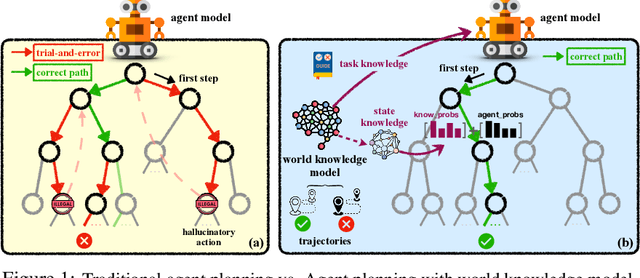
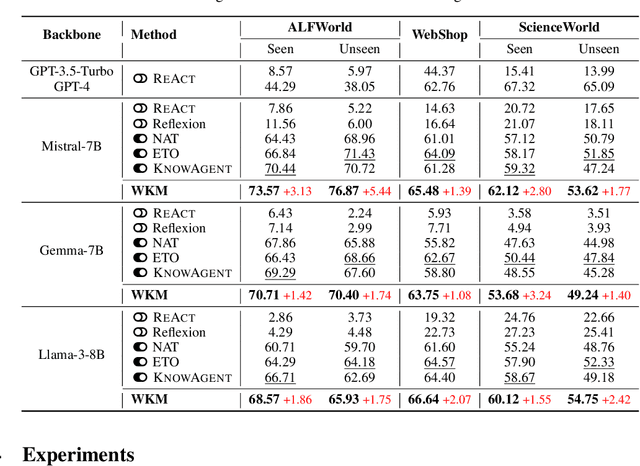
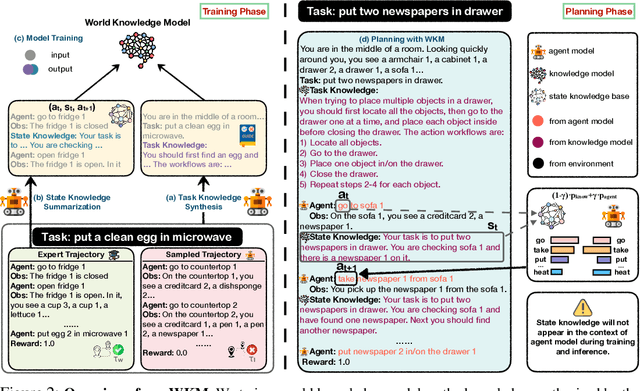

Abstract:Recent endeavors towards directly using large language models (LLMs) as agent models to execute interactive planning tasks have shown commendable results. Despite their achievements, however, they still struggle with brainless trial-and-error in global planning and generating hallucinatory actions in local planning due to their poor understanding of the ''real'' physical world. Imitating humans' mental world knowledge model which provides global prior knowledge before the task and maintains local dynamic knowledge during the task, in this paper, we introduce parametric World Knowledge Model (WKM) to facilitate agent planning. Concretely, we steer the agent model to self-synthesize knowledge from both expert and sampled trajectories. Then we develop WKM, providing prior task knowledge to guide the global planning and dynamic state knowledge to assist the local planning. Experimental results on three complex real-world simulated datasets with three state-of-the-art open-source LLMs, Mistral-7B, Gemma-7B, and Llama-3-8B, demonstrate that our method can achieve superior performance compared to various strong baselines. Besides, we analyze to illustrate that our WKM can effectively alleviate the blind trial-and-error and hallucinatory action issues, providing strong support for the agent's understanding of the world. Other interesting findings include: 1) our instance-level task knowledge can generalize better to unseen tasks, 2) weak WKM can guide strong agent model planning, and 3) unified WKM training has promising potential for further development. Code will be available at https://github.com/zjunlp/WKM.
 Add to Chrome
Add to Chrome Add to Firefox
Add to Firefox Add to Edge
Add to Edge